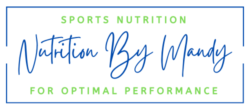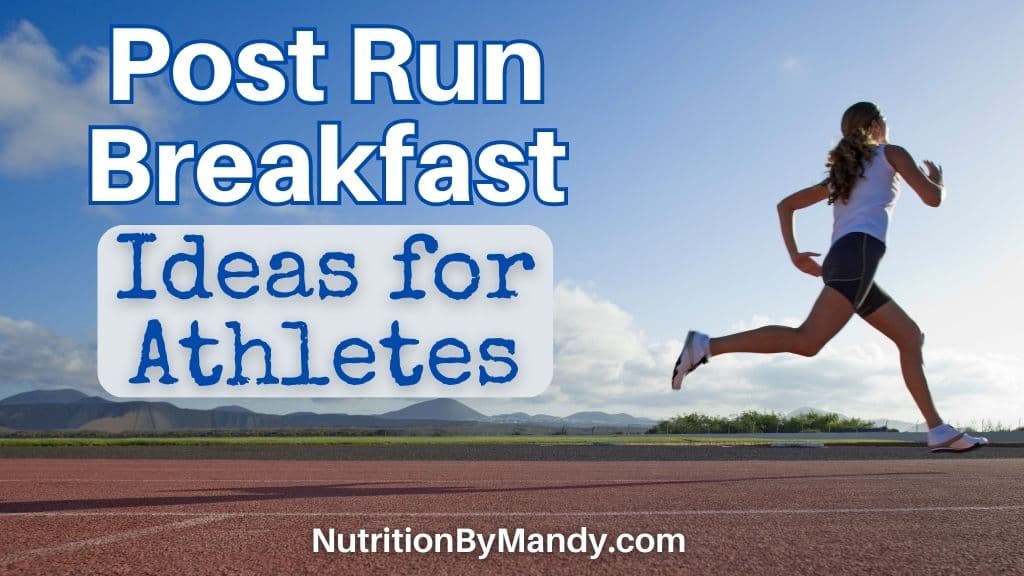17 Best Post Run Breakfast Ideas for Athletes
It can be helpful for athletes to have ideas for nutritious breakfasts they can enjoy after a morning run.
Let’s take a look at the recovery nutrition needs of athletes. Then we will explore ideas for creating a healthy post run breakfast for athletes.
Nutrition Needs Following a Run
Following a morning run, athletes should focus on building a breakfast that can support their bodies with recovering from the workout.
Recovery nutrition is particularly important for runners when the amount of time between workouts is limited.
This includes athletes who are doing multiple workouts in a single day or back-to-back days of intense running sessions.
There are three key concepts athletes should keep in mind to support recovery:
- Hydrating – Replace fluid and electrolytes lost in sweat during the run
- Carbohydrates – Refill energy stores used during the run
- Protein – Consume protein to help build and repair lean muscle mass

Post Run Breakfast: Hydration
Following a morning run, it is important for athletes to hydrate, replacing the fluid and electrolytes lost in sweat.
Weighing before and after activity can help athletes determine how much fluid was lost in sweat during the run. To replace the fluid, runners need to drink more fluid than the amount lost in sweat (1).
For example, for each pound of body weight lost during the activity, athletes should aim to drink ~20-24 oz (2.5-3 cups) of fluid.
When you have limited time before your next run, replacing this fluid is especially important to ensure you start the next run in a hydrated state.
Post Run Breakfast: Electrolytes
In addition to fluid, athletes lose electrolytes when they sweat.
The main electrolyte lost in sweat is sodium. Thus, including sodium in the post run breakfast can help athletes with replacing sweat losses. In addition, the sodium will help the athlete better retain the fluid they drink after a run (2).
Ideas for including sodium in your post run breakfast include:
- Cheese, cottage cheese
- Turkey sausage, deli meat
- Bread, bagels (salt added as a preservative)
- Salted nuts, nut butters, seeds
- Vegetable or tomato juice
- Condiments: Salsa, ketchup
*Note: Talk with your doctor or a sports dietitian nutritionist about staying hydrated if you are on a low-sodium diet or are required to limit your fluid intake.

Post Run Breakfast: Carbohydrates
Carbohydrates provide the body with the energy needed to perform at its best. During a run, the body’s stores of carbohydrates become depleted.
Therefore, consuming a high-carb breakfast following a run can help to replenish these stores.
Sources of carbohydrates that runners can enjoy at breakfast following a run include:
- Bagel, bread, English muffin, wraps, tortillas
- Fruit: Fresh, dried, frozen, canned in natural juices, 100% fruit juice
- Oatmeal, grits, breakfast cereal
- Milk, yogurt
- Fruit smoothie
Whole Grain Carbohydrates
When possible, runners should look to include whole grains in their sports nutrition meal plan.
Whole grains contain fiber, vitamins, and minerals, making them a nutritious addition to an athlete’s diet.
When selecting whole grain items, read the package to ensure the product is 100% whole grain. When reading the ingredient list, the word “whole” should be listed as the first ingredient in the product, such as whole wheat, whole rye, or whole oat.

Post Run Breakfast: Protein
Including protein in the post run breakfast is important to support the repair and building of lean muscle mass.
I find adding protein to breakfast is an area on which many athletes, including runners, need to place additional focus.
Following a morning run, athletes should aim to consume ~0.25 – 0.3 grams of protein per kilogram of body weight. In general, this calculates to be in the range of 20-40 grams of protein, with larger athletes needing more protein than smaller athletes (1, 3).
Runners can easily meet their protein needs at breakfast with food. Below are several ideas for ways athletes can add protein to their post run breakfast.
Eggs
Eggs are a convenient way for athletes to add protein to their post run breakfast.
One large egg contains 6 grams of protein (4). The majority of the protein in the egg comes from the egg white (4 grams), however, the yolk is rich in vitamins and minerals.
Eggs contain choline, important for cognitive function, as well as selenium, riboflavin, Vitamin K, and antioxidants (3). Thus, eggs are a nutritious addition to a runner’s morning meal.

Ultra-Filtered, High-Protein Milk
Ultra-filtered, high-protein milks are filtered to remove the lactose and contain a concentrated protein and calcium content.
A cup of ultra-filtered milk provides ~13 grams of protein compared to 8 grams in a cup of regular milk (5, 6).
Athletes can add ultra-filtered milk to their oatmeal, breakfast cereal, smoothie, or enjoy it as a drink to boost the protein content of their post-run breakfast.
Cottage Cheese
Cottage cheese is an excellent source of protein, providing ~28 grams of protein per 1 cup serving (7).
With the post run breakfast, athletes can enjoy cottage cheese topped with fruit, seeds, or nuts for a nutrient packed meal.
Athletes who do not like the texture of cottage cheese, can try blending it into a smoothie for added protein. The cottage cheese will make the smoothie extra creamy without altering the flavor.
Another great use for cottage cheese at breakfast is mixing it into eggs before scrambling them. The cottage cheese will add protein to the eggs and give them a creamy texture.
Greek Yogurt
Greek yogurt is a great way to add protein to an athlete’s post run breakfast. A 5.3 oz container of Greek yogurt contains ~13 grams of protein (8).
Athletes can use Greek yogurt to make a parfait with frozen berries and whole grain breakfast cereal.
Greek yogurt also makes a great addition to a fruit smoothie and can be used as an ingredient in preparing protein overnight oats.
Plant-Based Protein Sources
There are a variety of ways athletes following a vegetarian or vegan diet can add protein to their post run breakfast.
Here are several plant-based protein sources athletes may consider adding to their meal.
- Soy milk, soy yogurt, tofu
- Vegan egg substitutes
- Nuts, nut butters, beans, seeds
- Greek-style, plant-based yogurts
- High-protein, plant-based milk

17 Best Post Run Breakfast Ideas
Putting this all together, here are 17 ideas for breakfasts that athletes can get enjoy following their morning run.
- Overnight oatmeal with blueberries and sliced almonds, high-protein milk
- English muffin breakfast sandwich with ham, egg, and cheese, 100% fruit juice
- Breakfast bowl with quinoa, hard-boiled eggs, sliced avocado, fresh berries, and nuts, low-fat milk
- Bagel with nut butter, honey, and sliced banana, high-protein milk
- Potato and egg breakfast tacos on wheat tortillas, salsa, sliced avocado, fresh sliced melon, 100% fruit juice
- French toast made on whole grain bread, sliced strawberries, low-fat milk
- Kodiak® Cakes protein pancakes, scrambled eggs, fresh sliced fruit cup, 100% fruit juice
- Greek yogurt and fruit parfait, avocado toast, low-fat milk
- Instant oatmeal with raisins and walnuts, banana, low-fat chocolate milk
- Breakfast wrap with scrambled eggs, turkey sausage, and sauteed vegetables, fresh berries, 100% fruit juice
- Whole grain toaster waffles with almond butter, cottage cheese with pineapple, 100% fruit juice
- Smoothie bowl made with Greek yogurt, topped with chia seeds, walnuts, fresh berries, sliced banana, and whole grain breakfast cereal, high-protein milk
- Post-run smoothie, breakfast bars
Post Run Breakfast: Restaurant Options
Athletes who need a quick breakfast can find ways to meet their nutrition needs at restaurants.
- Chick-fil-A: Egg white grill, Greek yogurt parfait with granola, fresh fruit cup
- Panera Bread: Avocado, egg white, spinach and cheese breakfast sandwich, Greek yogurt with mixed berries parfait, strawberry smoothie
- First Watch: Power breakfast quinoa bowl with turkey sausage, avocado toast, fresh seasonal fruit
- IHOP: Protein power pancakes, sliced ham, 100% fruit juice.
17 Best Post Run Breakfast Ideas
You are now set with a variety of ideas for creating a post run breakfast for athletes that supports their recovery nutrition needs.
For additional sports nutrition tips for athletes, check out my blog: Dinner for Athletes: 11 Easy Ideas.
Join the Nutrition By Mandy Email List & Get a Free Athlete’s Grocery List
Click HERE to join the Nutrition By Mandy e-mail list. When you join you will receive a free athlete’s grocery list to print and take with you to the store.
About the Author
Mandy Tyler is a Sports Dietitian Nutritionist in the San Antonio, TX area. She is a Registered and Licensed Dietitian, a Board-Certified Specialist in Sports Dietetics, a Licensed Athletic Trainer, and is a Certified Exercise Physiologist through the American College of Sports Medicine. Mandy has experience working with athletes at the high school, collegiate, and professional levels. She believes the key to reaching one’s full potential, both in everyday life and in sports performance, relies on a healthy nutritional foundation.

If you are looking to take your performance to the next level, make sure to check out my new Sports Nutrition Game Day Guide. This downloadable guide is written to help athletes develop an individualized plan to achieve peak performance on game day.

